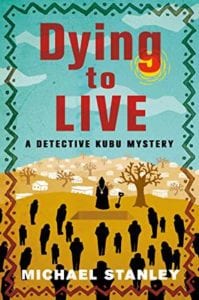
Finalist of the 2018 Shelf Unbound Competition for Best Independently Published Book
Shelf Unbound: Tell us about your book.
Michael Stanley: Dying to Live is a story about what would happen if a plant were found that enabled people to live longer. It is a story of avarice and greed.
When an old Bushman is found dead at the side of a Kalahari road, the police are suspicious he may have been murdered. An autopsy reveals that his internal organs are those of a young man, and a bullet found embedded in an abdominal muscle not only was typical of one used a hundred years earlier, but also had no entry wound.
Word gets out, and the Bushman’s body is stolen from the morgue. Also, a local witch doctor, famous for purveying a tonic to extend life to wealthy clients, disappears, as does an American academic who is close friends with the CEO of a pharmaceutical company.
Both the Bushman and the witch doctor were thought to have found a plant in the Kalahari that prolonged life. With the promise of enormous profits to whoever found the plant, the search was on. And any obstacle was quickly pushed aside.
Assistant Superintendent David “Kubu” Bengu and his colleague Detective Samantha Khama are called on to investigate.
At the same time, Kubu and his wife are wrestling with the deteriorating health of their adopted, HIV-positive daughter. As she deteriorates, they are faced with the temptation to find the plant and use it on their daughter. This results in a huge disagreement, and Kubu leaves home.
Eventually, Kubu and Samantha are sure they know who is responsible for the murders, but have little concrete evidence to convict him. Kubu devises a dangerous deceit to get the proof they need.
Shelf Unbound: How did you go about developing this book?
Stanley: The idea for the book came from a case of biopiracy. For hundreds of years, Bushmen have used the hoodia plant to suppress their appetites when running after antelope they have shot with a poisoned arrow. Sometimes, a large antelope may run for several days before collapsing. About twenty years ago, the South African Council for Scientific and Industrial Research (CSIR) isolated the chemical it believed to be responsible. It then sold the rights to a European pharmaceutical company for commercialization.
There was an outcry that both the CSIR and the company had stolen indigenous intellectual property—that is, the knowledge of the Bushmen about the properties of hoodia—without compensation. Eventually, an agreement was made whereby the Bushmen would get a percentage of any profits made.
It was an easy step for us to imagine the existence of a similar plant that would extend life. After all, the Kalahari is huge, and there are doubtless hundreds of plant species that have yet to be discovered. We then thought about the frenzy that would result if such a plant became known. The profit potential would be almost unlimited, and people would go to great lengths to control the market.
With that back story, we were left with devising an entertaining murder mystery around it.
Shelf Unbound: What was the experience of writing this book like for you?
Stanley: Dying to Live is the sixth Detective Kubu mystery, and the experience mirrored the earlier ones. Once we had settled on the back story, we did a lot of research on biopiracy, as well as on the remarkable abilities of Bushmen as botanists. We then wove this into a story about human frailty—a theme of all our stories. In this case, the frailty was closer to home for Kubu and his family than in previous books. At the end of the story, Kubu has to resolve a huge, personal, moral dilemma.
Shelf Unbound: What writing advice do you have for indie authors?
Stanley: Don’t give up your day job! Don’t isolate yourself—join a writing group or write with someone.
Find the style that suits you—do you like to plot the story before writing (a plotter)? Or do you prefer to make it up as you write (a pantser—writing by the seat of your pants)?
Listen to your inner voice—don’t ignore it when it tells you something isn’t quite right, even if it means a major rewrite. Have your manuscript professionally edited before submitting it to an agent or publisher.
Shelf Unbound: What are you working on next?
Stanley: We have just finished the manuscript of a stand-alone thriller, Dead of Night, that has as its back story the poaching of rhinos and the smuggling of rhino horn. It features a Minnesota woman of Vietnamese descent as its protagonist. It will be first released in mid-2018 in the UK by Orenda Books.
